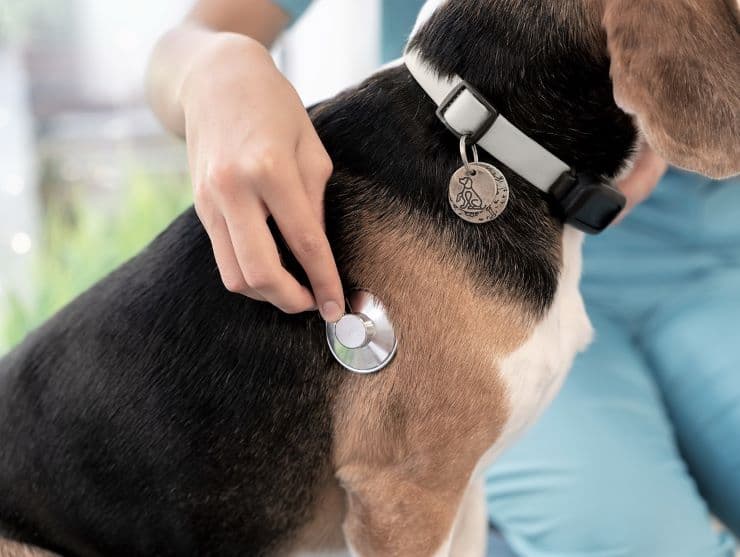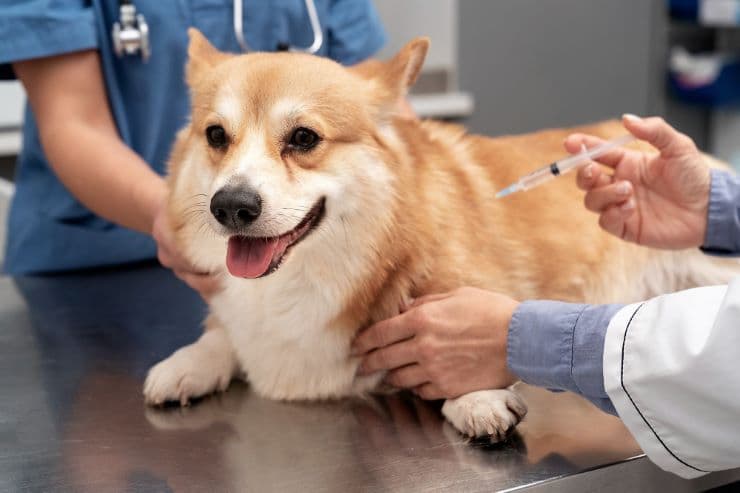There is nothing wrong with saying that dogs are the most cherished pets, as they bring joy and companionship into our lives. Unfortunately, canines can carry diseases transmissible to humans, known as zoonotic diseases.
These diseases pose a risk not only to our furry friends but also to our own health. However, advancements in animal health solutions have proved effective for better control and management of these common veterinary diseases.
Here, we will review the different types of advanced veterinary health solutions helpful in handling canine zoonotic diseases. Moreover, we will discuss the challenges associated with implementing these solutions and a few examples of success.

Photo Credit: Image by Freepik
Let’s learn the details!
Different Types of Advanced Animal Health Solutions
Some efficient veterinary solutions for controlling zoonotic diseases in dogs are as follows:
Advanced Diagnostic Tests
Timely and accurate diagnosis is crucial in controlling canine zoonotic diseases. Advanced diagnostic tests have made it easier for veterinarians to identify and treat these diseases promptly.
For example, serological tests can detect the presence of antibodies against certain zoonotic pathogens in a dog's blood. Thus, vets can diagnose infections like brucellosis and echinococcosis. Besides that, Polymerase Chain Reaction (PCR) tests are valuable for diagnosing zoonotic diseases.
Early detection through these tests devises appropriate treatment options and helps prevent the spread of the disease to humans.
Adequate and Effective Vaccines
In the fight against zoonotic diseases in dogs, to date, vaccines have been the most effective weapon. These preventive measures not only protect our furry companions but also create a barrier against disease transmission to humans.
One of the common examples is the rabies vaccine.
Besides that, vaccines are available for various other zoonotic complications, including:
- Leptospirosis
- Canine influenza
- Lyme disease
New and Efficient Treatment Options
Effective treatment becomes paramount after diagnosing a zoonotic disease in dogs.
Depending on the specific disease, advanced animal health solutions have provided us with a range of treatment options, including:
- Antiparasitic Drugs
- Antibiotics
- Antiviral Medications
For instance, if a dog is diagnosed with giardiasis, treatment with antiparasitic drugs can help eliminate the parasite. As a result, the chances of its transmission to humans will be minimal.
Furthermore, advancements in treatment methods have made it possible to manage chronic zoonotic infections in dogs more effectively.

Photo Credit: Image by Freepik
Surveillance Systems
We need comprehensive surveillance systems to manage and control canine zoonotic diseases effectively. These systems monitor disease prevalence in dog populations. Plus, they enable timely responses to outbreaks and help prevent human infections.
With the help of data analysis and advanced technology, we can now benefit from implementing sophisticated surveillance systems. Doing so will help us track disease trends and identify high-risk areas.
Surveillance systems also facilitate the collection of valuable data on zoonotic diseases, such as:
- Geographic distribution of infections
- Seasonal variations
- Identification of potential reservoir hosts
This information is crucial to reducing the transmission of zoonotic diseases by implementing targeted interventions and public health campaigns.
Challenges Of Using Advanced Veterinary Health Solutions
Advanced animal solutions offer promising ways to control canine zoonotic diseases. However, the following challenges need to be addressed for their successful implementation.
Limited Access
Access to advanced solutions can be limited in regions with limited veterinary resources. Improving access to vaccines and diagnostic tests is essential to control zoonotic diseases in dogs more effectively.
Higher Cost
One of the primary challenges is the cost associated with advanced animal health solutions. Vaccines, diagnostic tests, and treatments can be expensive, making them inaccessible to all pet owners. To ensure widespread adoption of these solutions, they must be more affordable and accessible.
Lack of Awareness
Many pet owners are unaware of the zoonotic risks associated with their dogs. This lack of awareness can lead to delayed diagnosis and treatment. As a result, the risk of disease transmission to humans can significantly increase.
Public education campaigns and outreach efforts are crucial to inform pet owners about the role of advanced vet health solutions in protecting dogs and humans.
Examples of Successful Implementation of Advanced Animal Health Solutions
There are various examples of success in using advanced veterinary health solutions.
Let’s review a few of them!
Leptospirosis Control
Advanced diagnostic tests have enabled veterinarians to diagnose and treat leptospirosis more effectively in dogs. By identifying infected dogs early, appropriate treatment helps reduce the risk of transmission of diseases to humans.
Rabies Elimination in Dogs
Through the widespread vaccination of dogs against rabies, many countries have successfully controlled this deadly zoonotic disease. This success demonstrates the power of vaccines as a critical tool in preventing canine zoonotic diseases.
Canine Heartworm Management
The development of heartworm preventatives and improved diagnostic tests have led to better control of canine heartworm disease. This parasitic infection can transmit to and affect humans as well. The successful implementation of preventive measures has significantly reduced the risk of this disease in dogs and the potential for zoonotic transmission.
Saying it All!
Dog zoonotic diseases are a genuine concern, but advanced animal health solutions offer hope in managing and controlling these threats. Addressing challenges such as cost, access, and lack of awareness is crucial to ensure these advanced solutions benefit all pet owners. By investing in animal healthcare, we can protect the well-being of our furry friends as well as humans.
For more guides on common veterinary diseases and veterinary surgeries, the Vet and Tech educational platform is one of the most reliable sources. This platform features various veterinary resources for veterinarians and pet owners alike.
FAQs
What Is Vaccination Cost for My Dog Against Zoonotic Diseases?
It can vary depending on the type of vaccine and your location. It’s wise to discuss the options and cost with your veterinarian. Generally, vaccines are an investment in your pet's health and can help prevent costly treatments in case of infection.
How Can I Raise Awareness About Zoonotic Diseases?
This could be done by organizing educational events, distributing informational pamphlets, or using social media platforms. Plus, collaborate with local veterinarians and animal health organizations to reach a broader audience.
How to Access Advanced Diagnostic Tests in Rural Areas?
Consider consulting with your local veterinarian to guide you on available options. In some cases, you can also send samples to a specialized laboratory for testing.
You may also like: Epilepsy in Dogs: How to Support Your Pet Through Seizures

Leave a Reply